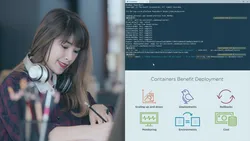
Running Jenkins in Docker 
This course will teach you how to use Docker to manage Jenkins agents, simplifying the process of running a Jenkins master/agent architecture. ▼
ADVERTISEMENT
Course Feature
![]() Cost:
Cost:
Free Trial
![]() Provider:
Provider:
Pluralsight
![]() Certificate:
Certificate:
Paid Certification
![]() Language:
Language:
English
![]() Start Date:
Start Date:
On-Demand
Course Overview
❗The content presented here is sourced directly from Pluralsight platform. For comprehensive course details, including enrollment information, simply click on the 'Go to class' link on our website.
Updated in [April 29th, 2023]
Course Overview:
This course, Running Jenkins In Docker, will teach you how to use Jenkins in Docker containers. You will learn the fundamentals of Docker, the Jenkins agent architecture in the Docker paradigm, and how to implement a fully distributed build farm using Docker containers. By the end of this course, you will have the skills and knowledge of Jenkins and Docker needed to automate your build agents.
Possible Development Directions:
This course will provide you with the skills and knowledge to get started with Jenkins and Docker. After completing this course, you can further develop your skills by exploring more advanced topics such as Jenkins pipelines, Docker orchestration, and Jenkins security.
Related Learning Suggestions:
If you are new to Jenkins and Docker, it is recommended to start with the basics. You can find many tutorials and courses online to learn the fundamentals of Jenkins and Docker. Additionally, you can join online communities and forums to ask questions and get help from experienced users.
[Applications]
After completing this course, learners can apply their knowledge of Jenkins and Docker to automate their build agents. They can also use Docker containers to create a fully distributed build farm. Additionally, learners can use the fundamentals of Docker to create and manage their own Docker containers.
[Career Paths]
1. DevOps Engineer: DevOps Engineers are responsible for managing the development, testing, and deployment of applications and services. They are also responsible for automating processes and ensuring that systems are secure and reliable. With the knowledge gained from this course, DevOps Engineers can use Docker to manage Jenkins agents and automate the build process.
2. Software Developer: Software Developers are responsible for designing, developing, and testing software applications. With the knowledge gained from this course, Software Developers can use Docker to manage Jenkins agents and automate the build process.
3. System Administrator: System Administrators are responsible for managing and maintaining computer systems. With the knowledge gained from this course, System Administrators can use Docker to manage Jenkins agents and automate the build process.
The demand for DevOps Engineers, Software Developers, and System Administrators is increasing as organizations move towards automation and cloud-based solutions. With the knowledge gained from this course, these professionals can use Docker to manage Jenkins agents and automate the build process, making them more efficient and productive.
[Education Paths]
1. Bachelor of Science in Computer Science: This degree program provides students with a comprehensive understanding of computer science principles and their application to the development of software and hardware systems. Students learn to design, develop, and maintain computer systems, as well as develop algorithms and software applications. This degree is becoming increasingly popular as the demand for computer science professionals continues to grow.
2. Master of Science in Software Engineering: This degree program focuses on the development of software applications and systems. Students learn to design, develop, and maintain software applications and systems, as well as develop algorithms and software applications. This degree is becoming increasingly popular as the demand for software engineering professionals continues to grow.
3. Bachelor of Science in Information Technology: This degree program provides students with a comprehensive understanding of information technology principles and their application to the development of software and hardware systems. Students learn to design, develop, and maintain computer systems, as well as develop algorithms and software applications. This degree is becoming increasingly popular as the demand for IT professionals continues to grow.
4. Master of Science in Cybersecurity: This degree program focuses on the development of secure systems and applications. Students learn to design, develop, and maintain secure systems and applications, as well as develop algorithms and software applications. This degree is becoming increasingly popular as the demand for cybersecurity professionals continues to grow.
Course Provider

Provider Pluralsight's Stats at AZClass
Pluralsight ranked 16th on the Best Medium Workplaces List.
Pluralsight ranked 20th on the Forbes Cloud 100 list of the top 100 private cloud companies in the world.
Pluralsight Ranked on the Best Workplaces for Women List for the second consecutive year.
AZ Class hope that this free trial Pluralsight course can help your Docker skills no matter in career or in further education. Even if you are only slightly interested, you can take Running Jenkins in Docker course with confidence!
Discussion and Reviews
0.0 (Based on 0 reviews)
Explore Similar Online Courses

PostgreSQL Essential Training

React and Redux Masterclass

Python for Informatics: Exploring Information

Social Network Analysis

Introduction to Systematic Review and Meta-Analysis

The Analytics Edge

DCO042 - Python For Informatics

Causal Diagrams: Draw Your Assumptions Before Your Conclusions

Whole genome sequencing of bacterial genomes - tools and applications

Managing Docker on Linux Servers

Fundamentals of Docker and Kubernetes for NET Developers

WSL 2 Docker Kali Linux and Windows Terminal - get started
 Related Categories
Related Categories
 Popular Providers
Popular Providers
Quiz
 Submitted Sucessfully
Submitted Sucessfully
1. What is the main purpose of this course?
2. What is the main benefit of running Jenkins agents in Docker?
3. What will you learn in this course?


Start your review of Running Jenkins in Docker